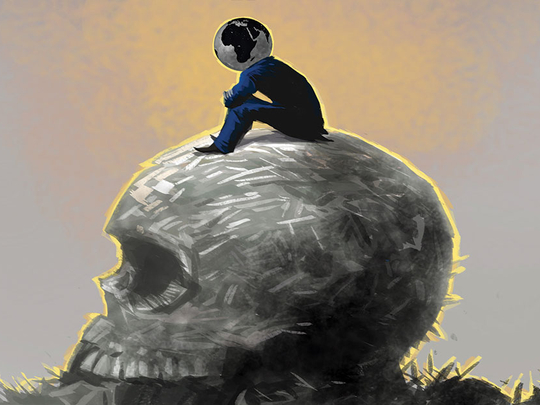
When it comes to Daesh (Islamic State of Iraq and the Levant), the headlines always scream and that is because they refer to news stories that speak of ancient terrors and dread facts. The latest? Japanese photojournalist beheaded, Jordanian fighter pilot immolated.
It all makes it seem as if our part of the world is suffering the greatest disaster that could befall mankind — the destruction of one’s moral values and with them, one’s social order. In its time, Daesh has committed many egregious acts that made us turn away in nauseated disbelief, but the one act that seems to have passed largely unnoticed is that the group has reacquainted us, albeit indirectly, with our primal roots as unthinking savages and reconnected us to our shared barbaric past as Savannah primates.
Daesh is not a phenomenon unique to the Middle East, though at first-blush it may appear to be just that. For, who else anywhere around the world today equals its horrific excesses? But the truth is that its horrors are an extension of that collective yearning we have in our human archetype for a partial return to the manner of beasts, the yearning to project the beast’s penchant for wanton violence. It is a penchant that we as humans have often evinced, across cultures and across millennia.
In our time, we evinced it in Nazi concentration camps, in the Bataan death march, in the massacre of villagers at My Lai, in the Gulag in Siberia, in King Leopold’s ghosts in the Congo, in the bodies thrown in the well at Deir Yassein, in France’s atrocities in Algeria and Britain’s racist excesses in India ... So it goes. On and on. And to paraphrase the Messenger from Nazareth, let the nation, or people, without sin throw the first stone.
For tucked away in the attic of our past — mockingly remote from the seemingly civilised norms of our present — are records of our dreadful deeds, implicating all of us. We are all poseurs, as it were, imagining our cultures, our mythologies of hope, our moral values, to be superior to those of the “other”. The French, for example, did not go to Vietnam to colonise it, exploit its resources and regroup its political destiny in response to France’s geopolitical interests. Rather, they went there armed with their La Mission Civilizatrice, just as the British went to India armed with their concept of the White Man’s Burden and, more recently, the Americans went to Iraq armed with the good intention of introducing Iraqis to Jefferson — though resorting to shock and awe when the natives got restless.
The “wretched of the earth”, as Franz Fanon called them, do indeed exist. So does, as Karl Jung called it, the universal archetype, that force lurking in our shared humanity capable of exuding evil, whether we are from Xinjiang province in China or the Republic of Chechnya in the Caucasus Mountains, the Midwest in America or the Mideast in the Arab world, from the “civilised West” or the “underdeveloped East”. We are all, Biblical fashions of expression aside, sinners.
We are now, and have always been throughout our human history, equal partners in our commitment to evil, unworthy of being denizens of Eden from whence we had been expelled. And this is what we have struggled to do all along, ever since men became men, imbued with both conscience and consciousness: Recapture that lost Eden of our dreams. In the name of that struggle, humanity has killed millions upon millions of its own species, in our lifetime alone, in that epic search, say, for the Communist dream of the “classless society”, the Nazi fantasy of the “Aryan race” and more recently, the halcyon days of the “righteous Caliphate”.
The caliphniks in the Levant, mimicking other demented dreamers before them, have projected a limitless capacity for evil — limitless, because evil, like Pi, has no final decimal point, no terminus. But caliphniks are not pioneers of evil. They did not invent the beheading of unbelievers or the immolation of enemies. The beheading of “evildoers”, via guillotine, was a common practice in Europe until very recently in history, with the last one taking place in France in the mid-1970s.
And burning people at the stake, or auto-da-fe, where the victim is bound to a large wooden stake and literally burnt to death, has had a long history there, used as capital punishment for acts of treason, rebellion, witchcraft, heresy and perceived sexual deviance. The last victim of auto-da-fe in Spain, for example, took place in Madrid in 1721 during the Inquisition. The victim was — and the folks at Daesh will eat their hearts out at not having matched the barbarity of it yet — a 96-year-old Jewish woman called Maria Barbara Carillo, who had been forcibly baptised but was accused of being a lapsed Jew, having secretly practised Judaism.
Let us all show our moral outrage at the news of what Daesh did recently. Let us also mourn our human condition, especially because the bard may be right after all — that the evil that men do lives after them, to bedevil the victims’ families for years to come.
Fawaz Turki is a journalist, lecturer and author based in Washington. He is the author of The Disinherited: Journal of a Palestinian Exile.












